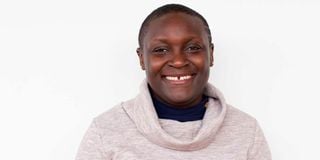One-on-one with Nyambura, a citizen archivist

What you need to know:
- Radio Kikuyu came out of a desire to develop a sound and text archive that would be in conversation with the fact of radio’s power in daily Kenyan life and its role in the violence that happened in the contested 2007 elections.
- I started archiving because I realised my insider/outsider status in relation to radio in Kikuyu (the only local language I speak) gave me a unique window into the narratives that were forming in the 2017 election year.
- I also used Twitter to make it both synchronous and publicly available as I am very keen on open access to information.
Nyambura is a Nairobi-based multidisciplinary artist, citizen archivist and communications maven. Their work includes the literary project 100 on Books, the podcast Corpus & Radio Kikuyu, as well as writing in various outlets. You can always find them studying the ways media and society intersect.
1. Do you really read 15 books a week? Where do you find time, between your day job and all your other interests, to not only read but document all your reads?
I don’t read 15 books a week, Abi, more like five. I allot at least an hour to reading every day, although I’ll often also read if I am sitting in traffic, waiting in line and so on. I also listen to audiobooks whenever I do my chores and while on morning walks.
2. What is a citizen archivist, and how did you get into communications? Do you think that communications is a type of career that is natural to a writer?
A citizen archivist is a person engaged in archival practice without formal training. I’d say communications chose me. I joined AIESEC as a 19-year-old, was assigned to the communications function because I was familiar with blogging and social media in those early days, and the rest is history.
Comms is definitely a great fit for a writer as one gets to wield their way with words while making room for the constraints that come with clients and employers, which often make for interesting challenges.
3. Tell us a little bit more about Corpus and Radio Kikuyu - why did you start archiving? What’s the idea behind the name? What do you think these two projects have taught you?
Corpus (sometimes styled cOrPUS) is a collaborative project that I started with my friend Don Handa, who is currently the Curator at the Nairobi Contemporary Art Institute (NCAI) to archive (that word again!) Eastern African visual art. Currently a podcast, we hope to extend it into a multimedia documentary project. The idea behind the name Corpus is our desire to speak about the body (corpus in Latin) of work (opus) coming out of the region in the visual art space.
Radio Kikuyu came out of a desire to develop a sound and text archive that would be in conversation with the fact of radio’s power in daily Kenyan life and its role in the violence that happened in the contested 2007 elections. I started archiving because I realised my insider/outsider status in relation to radio in Kikuyu (the only local language I speak) gave me a unique window into the narratives that were forming in the 2017 election year. I also used Twitter to make it both synchronous and publicly available as I am very keen on open access to information.
Both of these projects have taught me the value of documentation and the importance of funding for arts and research. While I’m proud of them, I regularly think about how much more would be possible with a grant or three.
4. There’s been quite a bit of debate on the piece by Carey Baraka on Ngugi wa Thiong’o. What are your thoughts - whether on the piece, or on the Kenyan literary scene’s reactions to the piece? Do you think the humanisation of great icons is important?
“No gods, no masters” is a slogan I live by and it is relevant in this case because, as I mentioned in my newsletter (which you can subscribe to on (https://substack.com/@100onbooks), the reactions made for interesting reading. I like that you framed the profile as humanisation because it highlights how dehumanising and invisiblising hypervisibility can sometimes be. As the author Lutivini Majanja pointed out in a conversation, we are unaccustomed to that level of intimacy and how revelatory of a person’s humanity it can be, and part of the chafing on display is some of us being forced to reconsider the pedestal Prof Ngugi has been placed on by our literary lives and loves.
5. Who are some of your favourite Kenyan authors, and what is the last great Kenyan book you read? Why did you love it?
Like every good bookish person, all my answers about favourites disappear when this question is asked but I’m still thinking about Khadija Abdalla Bajaber’s The House of Rust which I loved for its language and atmospheric storytelling.





